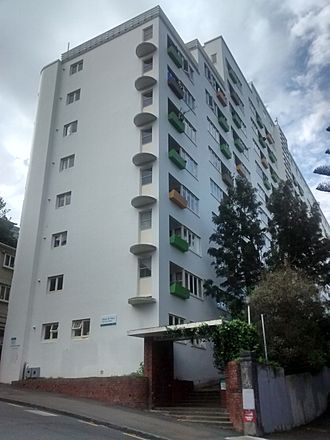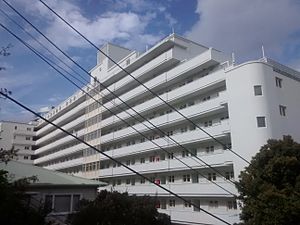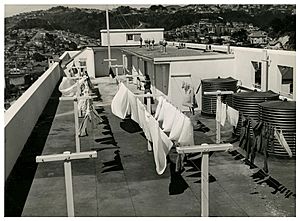Dixon Street Flats facts for kids
Quick facts for kids Dixon Street Flats |
|
|---|---|

The flats in 2014
|
|
| General information | |
| Architectural style | Modernist |
| Location | 134 Dixon Street, Wellington, New Zealand |
| Completed | 1944 (1947 in Kernohan) |
| Height | 30.5 m (100 ft) |
| Technical details | |
| Floor count | 10 |
| Design and construction | |
| Architect | Housing Construction Department (Gordon Wilson and Ernst Plischke) |
| Awards and prizes | NZIA Gold Medal 1947 |
| Designated: | 27-Jun-1997 |
| Reference #: | 7395 |
The Dixon Street Flats is a famous building in Wellington, New Zealand. It was designed by the Housing Division of the Ministry of Works. This building is important because it shows a special style of architecture called Modernist.
Contents
A Look Back: The History of Dixon Street Flats
The Dixon Street Flats were finished in 1944. They were built as part of a big plan by the first Labour Government. This plan was to create state housing, which means homes built by the government for people to rent.
Who Designed the Flats?
The main architect for the Dixon Street Flats was Gordon Wilson. He was the chief architect for the Department of Housing Construction. Another architect, Ernst Plischke, who was from Austria, also worked for the department. Many people think he had a big impact on the design, even though there isn't official proof.
Awards and Importance
In 1947, the building won the NZIA Gold Medal. This is a special award for great architecture in New Zealand. The Dixon Street Flats are seen as a very early and important example of Modernist apartment buildings in New Zealand.
It was the first major tall building and the first big apartment block built in Wellington after World War II. The building is ten stories high. It has 115 one-bedroom apartments. There is also a two-bedroom apartment for the caretaker, who looks after the building.
A Historic Landmark
In 1997, the Dixon Street Flats were officially named a "Category 1" historic place by Heritage New Zealand. This means it's a place with very special historical or cultural importance.
Building Community
In 2016, people started new ways to help the residents connect. Housing New Zealand and a local church began holding weekly tea gatherings. These events help people living in the flats get to know each other and build a stronger community.



